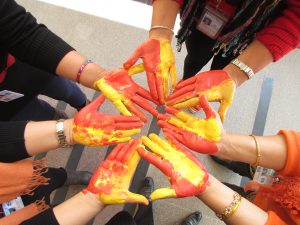With the enactment of a new, stricter, law in Nepal against the use of acid in attacks, perpetrators have now shifted to using hot oil. Although injuries from such attacks are often first-degree burns compared to acid attacks (which result in third-degree burns), weaker laws and little support from the government make the victims of such attacks vulnerable. Criminals resort to such methods knowing stricter punishment lies with the use of acid – and not with oil.
After years of public outcry and efforts by activists, the Nepal government approved an ordinance that oversees the sale and distribution of corrosive chemicals. The Acid and Other Harmful Chemicals (Regulation) Ordinance 2077 will now require anyone to have a license for the purchase and sale of such products. Also, buyers need to submit details to the Home Ministry within a week of any purchase and sellers have to keep a record of buyers.
On September 28 last year, Nepal President Bidya Devi Bhandari signed two ordinances into law regarding the regulation of acid sales and criminalizing perpetrators of acid attacks. The new law was welcomed with much fanfare, and as culprits now face up to 20 years in prison. Unfortunately, however, other burn attack victims were excluded from the new provision.
The lack of a stringent law against burn violence in Nepal has seen a spike in such crimes.
According to Burn Violence Survivors Nepal (BVSN), Nepali women are often subjected to burn attacks relating to dowry disputes, and when they reject male advances. The organization reports that around 245 cases have been reported since 2010, an average of 40 cases per year.
Last year Nepal’s Prime Minister K.P. Sharma Oli announced that the government would provide lifetime employment for acid attack victims, including medical, education, and living expenses.
Oli also announced that four hospitals would have a dedicated unit for acid victims: Tribhuvan University Teaching Hospital, Bir Hospital, Patan Hospital, and a Kirtipur-based hospital. The hospitals would provide free treatment to the acid attack victims, but burn survivors have to rely on their own finances – which makes low-income victims vulnerable.
While victims of acid attacks are supported by the Nepal government, oil burn survivors have nowhere to go.
The National Penal Code (2017) Article 193 (1-3) prohibits (all sic) “causing disfigurement by use of acid or other chemicals, biological or toxin substance, or throwing such substance on, that other person, or by burning, maiming, strolling the body with or applying to the body such substance or disfigure the face or any part of the body of that other person.”
The person who commits the offense will face imprisonment for a “term of five to eight years and a fine of one hundred thousand to five hundred thousand rupees in the case of disfigurement of the face, and to a sentence of imprisonment for a term of three to five years and a fine of fifty thousand to three hundred thousand rupees in the case of disfigurement of any other organ of the body or bodily pain.”
“The amount of fine collected under sub-section (2) shall be paid in whole to the victim as compensation,” the law states.
Despite these provisions, the act of hurling hot oil on others hasn’t stopped, as it is difficult to regulate the buying and selling of an everyday commodity.
Recently a school student, Puja Karki, became the victim of a hot oil attack and with no support from the state, an activist is pleading to the public to fund her dream of studying graphic design.
Longtime activist Ujjwal Bikram Thapa, who has been instrumental in bringing acid law changes and helping the victims, believes that leniency toward perpetrators who use hot oil to attack others must end, and rues the fact that hospitals and medical officers are often clueless as to how to treat such victims.
Thapa told The Diplomat, “I am thankful to the Nepal government for changing the acid law but unfortunately in the process, other burns victims are left out. The perpetrators should at least receive 10years of jail term and the government should support the victims for treatment.”
Thapa believes lenient laws on burn violence encourage criminals to exploit the loophole.
“The victims often come from low-income families and victims tend to target them. We need stricter laws for burns violence regardless of the substance that’s used. It will not only work as deterrence against criminally minded people but empower burns survivors at the same time.”

































